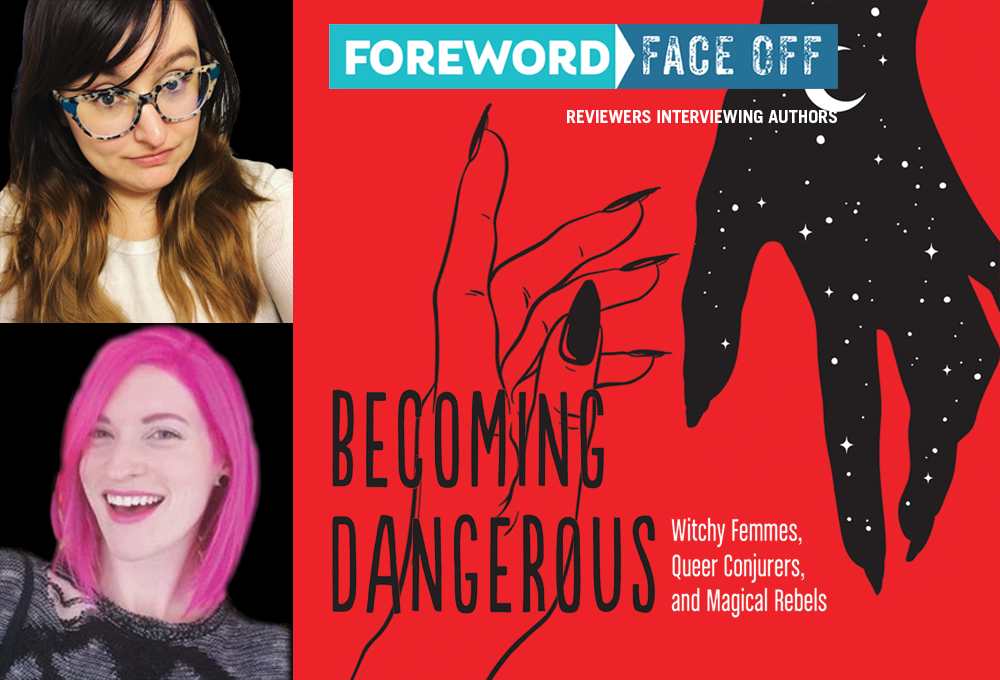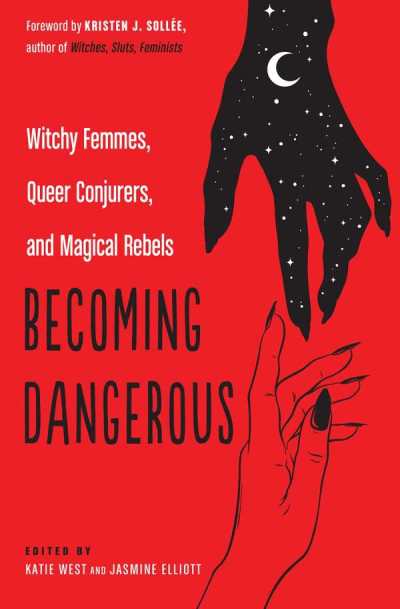Reviewer Claire Rudy Foster Interviews Katie West and Jasmine Elliott, Editors of Becoming Dangerous: Witchy Femmes, Queer Conjurers, and Magical Rebels

What’s the best way to acquire a sense of personal strength? Not the type that relies on aggression—that’s the stuff of bullies and tyrants. No, we’re talking about how to develop inner strength, power that radiates as confidence and assuredness. For many of us who deal with self-doubt and depression, imagine what a wonderful thing it would be to call up mojo on demand. And, for girls and women confronted with a daily dose of mansplaining, slut-shaming, sexism, and all manner of oppression, what could be more empowering than a practiced way to face down oppressors?

This week, we’re thrilled to spotlight Becoming Dangerous: Witchy Femmes, Queer Conjurers, and Magical Rebels, a collection of twenty-one essays from writers who use various rituals to summon power and own their lives. In her review for the May/June issue of Foreword, Claire Rudy Foster said that “Magic permeates the essays, which play with expectations of where power comes from. … [and] the many ways that women, femmes, and non-binary people find and create safe places as acts of resistance, beauty, and hope.” Claire welcomed the idea of engaging with the book’s editors, Katie West and Jasmine Elliott, so we contacted Red Wheel Weiser to set up this interview.
Claire, take it from here.
One of the things I loved most about Becoming Dangerous was the book’s deliberate commitment to diversity. The collection includes writing from people across a broad spectrum of race, gender, sexual identity, and experience. Was this an intentional choice, or one that arose organically?
Katie West: It was definitely an intentional choice. I think it’s my responsibility as a white woman operating in the publishing industry, a place where I am extremely privileged, to both create and hold space for voices and perspectives different from my own. That’s something I strive to do with all Fiction & Feeling’s books (UK publisher, of which, Katie is a founder) and Becoming Dangerous was no exception. I also just find it so much more interesting to open a book about a single topic, but get so many contrasting and differing views of it.
Jasmine Elliot: That’s definitely the MO of Fiction & Feeling (one that I heartily agree with and support), and what I love about the books that result is that readers always talk about the different pieces that resonate with them. There’s really a broad spectrum of relationships to ritual in Becoming Dangerous, and it provides all the more possibility that someone will pick up the book and connect with something in it.
How did you decide which writers to include? What kind of guidance did you give them?
KW: To begin with, I just asked all the writers I admire to be part of the book. Luckily, lots of them said yes! From there, I asked other people who they’d like to see in a book talking about ritual. I had a pretty hearty list of amazingly talented writers and though the list changed a bit over time, I’m so happy with the final lineup. A lot of people looked at Becoming Dangerous and thought it was about witchcraft, but it never was and was never intended to be. In choosing authors that represented a vast array of lived experience, I hoped to demonstrate that ritual and the power it could bring were accessible to all people in all situations. In terms of guidance, I told them I wanted to read an essay about their personal experience with using ritual to summon the power to survive and thrive in this world. I gave them some ideas about the tone I was looking for and some authors I felt exemplify that tone and then they could have at it. I was really pleased with what they came back to me with.
JE: Katie is really the one who knows all the fabulous writers (as one herself), so my relationship to the writers in this project was mainly through the editorial process. I think something we always end up doing is nudging our authors deeper into their feelings—in this case, the raw, vulnerable parts of themselves that their rituals seek to excavate, soothe, or otherwise shape. A lot of laughing and crying came out of that, for me.
merritt k notes that “Ritual doesn’t exist outside of capital.” The essays in Becoming Dangerous are rife with objects, totems, and exchanges. From dildos to face masks, many of the writers seem to find power in objects outside of themselves. Can spirituality ever exist outside of capital, in your opinion?
KW: Lately, my rituals seem to exist in direct opposition to capital. I like to wild swim, and it feels like ritual to me every time I do it, whether it’s in the sea, or a river, or a loch. And I don’t need any objects to make it happen, most of the time I don’t even have a swim suit. But I’m also aware that success in capitalism has allowed me the freedom and the free time to be able to fuck off and jump in the sea for an afternoon. So I think it’s difficult to escape the affects of capital despite how detached from material objects a ritual may be. I feel that ideally, spirituality exists outside of capital, so that when capitalism inevitably collapses, we’ll still be able to find some sort of solace inside ourselves, or at least outside of objects. But I don’t know.
JE: I don’t know if it’s possible right now, given that we as the performers can’t escape that system, which is a sad answer but my first instinct. This does, though, bring me back to Maranda Elizabeth’s piece; rituals can exist within capital but in direct opposition to capital, that implicit middle finger to a system by surviving within it as it tries to crush you. And hopefully when that system changes or collapses, rituals might change, but their fundamental purposes will remain.
Several of the essays explicitly link environment to spiritual experiences. Becoming Dangerous includes evocative descriptions of different types of landscapes, both urban and ultra-remote. Were any of these places novel or surprising to you, and how?
KW: I’m very into remote locations, so finding those places magical was no surprise to me; the less people the better, in my opinion. However, the way Maranda Elizabeth finds magic within the city opened my eyes to a whole new way of looking at urban areas. They looked at a city I’d lived in for a decade and found magic where I’d never seen it before. The juxtaposition between urban and ultra-remote also drew my attention to how access to certain environments changes depending on a person’s economic status, and as a result, not everyone has access to the same possibilities of spiritual experience.
JE: I’m a magic-of-the-city kind of person usually, but I ended up connecting deeply to pieces about being alone with fierce landscapes (Cara Ellison’s ruins in Scotland; Leigh Alexander and the ocean), and while the idea wasn’t novel to me at all, it drew me back to where I grew up, a jumble of rocks, forests, and lakes. Sometimes we miss the magic we once took for granted, and it takes looking through someone else’s eyes to reforge that connection.
Female rage and femme empowerment are vital elements of the collection. Spirituality as a form of resistance is a recurring theme in the book: claiming the self in the face of oppression, and pushing back against the status quo. How do you hope to create change by sharing this message with readers?
KW: I don’t really see this book as spiritual, unless I’m totally misunderstanding the definition of spiritual. I’m going to look it up now. Ooooh, okay, I was thinking about it wrong! Definition says spiritual means relating to or affecting the human spirit or soul instead of material things. In which case, yes, this book could be spiritual! I just want people to live their best lives. And to know they deserve to do so.
JE: One of the most powerful things I think you can offer a person who is in any kind of struggle is the feeling that they’re not alone. That’s one of the things I desperately hope people can take away from this book. We are many of us struggling in the current political and social climate, and we have our own individual struggles to own ourselves, to empower ourselves, to survive. But none of us are alone in that, and through the rituals we perform, we can feel a connection to something larger.
Magic is deeply personal, yet Becoming Dangerous embraces ritual as everyday practices. Sex work, meditation, and spells are three types of spiritual practice that feature prominently in the book. Why, in your opinion, is self-care still a radical act?
KW: Yeah, I think for marginalised people, self-care and self-love are radical acts. When systems of power are in place to condition you to hate yourself and scrutinise your worth and question your value and diminish your light, then yeah, doing the opposite is a radical action. I think taking care of yourself is important for everyone, but when you’re doing it in the face of such strong opposition, it becomes something else, something political and empowering.
JE: What Katie said exactly. I would add: I think in a system centred around capital, it’s easy to default to measuring our worth around our productivity, in which case self-care is the opposite: using energy to value yourself as a human. There’s something absolutely radical to that.
Claire Foster
